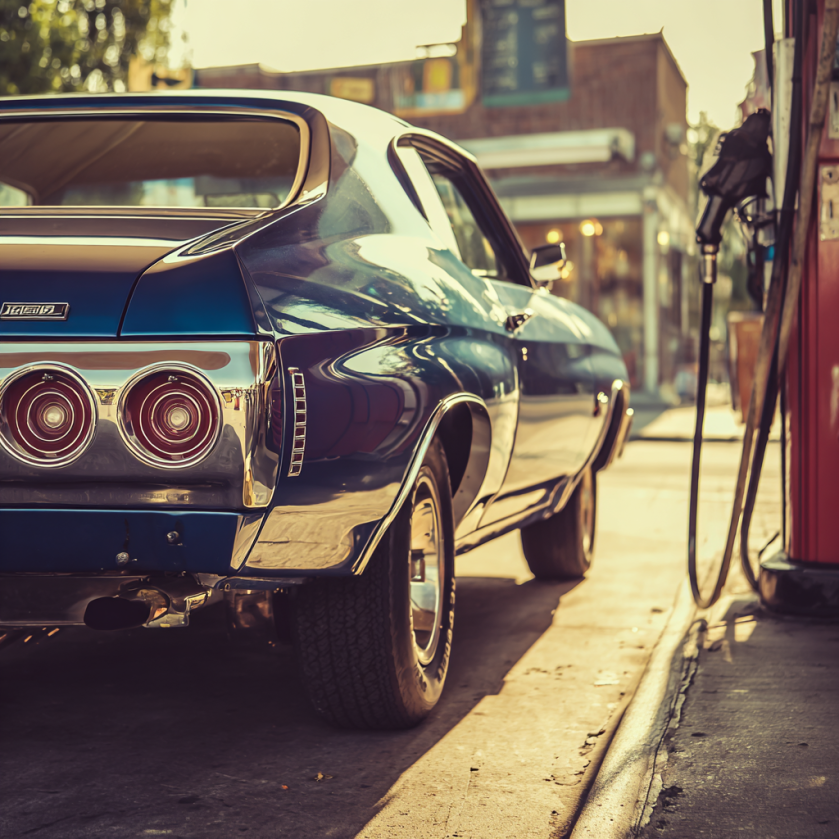An Octane-Boosted Ride Through the World of High-Performance Pump Choices With Michael Savage
There’s nothing quite like the rumble of a muscle car engine. Whether you’re driving a classic ‘69 Chevelle SS or a modern Dodge Charger, one thing’s for sure: your car isn’t just transportation—it’s a fire-breathing beast. And just like a champion racehorse, it needs the right fuel to run at its best.
But with all the options at the pump, how do you know what to choose?
Don’t worry, I’m breaking it down in simple, octane-fueled terms. Let’s pop the hood on this topic and talk about gas.
The Usual Suspects: Types of Gasoline
At your average gas station, you’ll find three main types of gasoline—each marked with a different octane rating:
- Regular (87 octane)
- Mid-grade (89 octane)
- Premium (91–93 octane)
Octane rating refers to a fuel’s ability to resist engine knocking, that nasty rattle that happens when fuel combusts too early in your engine’s cylinders. The higher the octane, the better the fuel can withstand compression without pre-igniting.
Muscle cars—especially those with high-compression V8s—need fuel that won’t ignite prematurely. Otherwise, you risk poor performance, lower fuel efficiency, and even engine damage. Yikes.
So, What Should You Feed the Beast?
Beyond the essential maintenance tips for muscle cars, owners must match the right gas to the machine.
Here’s an overview:
Classic Muscle Cars (Pre-1980s)
Think: Mustangs, Camaros, GTOs, and Chargers from the golden age of horsepower.
- Best fuel: Premium (91 or higher)
- Why: Older engines often lack modern anti-knock technology. They were originally designed to run on leaded fuel with high octane ratings.
- Pro tip: Consider an octane booster or lead substitute if your ride hasn’t been updated for modern fuel.
Modern Muscle Cars (Post-2000s)
Think: Mustang GT, Camaro SS, Dodge Challenger Scat Pack or Hellcat.
- Best fuel: Check the owner’s manual! Most recommend premium—especially for supercharged or turbocharged engines.
- Why: These engines use high compression and advanced timing to squeeze out maximum power. Using lower-octane gas could trigger engine knock sensors, which pull back performance to protect the engine. Translation: less roar, more whimper.
Modified Engines (Aftermarket Add-ons)
Think: You’ve added a cold-air intake, tuned the ECU, or bolted on a supercharger.
- Best fuel: Definitely premium, and possibly even racing fuel if you’re pushing serious horsepower.
- Why: More air + more fuel = more boom. You need a gas that won’t detonate early under pressure.
Don’t Fall for These Pit Stops
Myth: “Higher octane = more horsepower for any car.”
Nope. If your engine isn’t designed for high octane, premium gas won’t make it stronger. You’ll just be burning money, not rubber.
Myth: “I can save a few bucks by mixing mid-grade and premium.”
Modern engines are smarter than that. Stick to what your engine was built to run on—or risk pinging your way into the mechanic’s office.
Bonus Round: Race Gas, E85, and the Wild Side
- Race Fuel (100+ octane): For track use only—unless you’ve got a full race-tuned engine.
- E85 (85% ethanol): Cheaper and high-octane, but requires a flex-fuel conversion. Ethanol also burns faster and can damage old fuel systems. Use with caution (and tuning!).
- Octane Boosters: Handy in a pinch, especially for classics with picky engines.
Final Verdict: Read the Manual, Know Your Machine
Feeding your muscle car the right gas isn’t just about performance—it’s about respecting the beast. Whether you’re cruising Main Street or tearing down the quarter-mile, using the right fuel ensures your ride stays strong, smooth, and loud.
So the next time you pull up to the pump, skip the guesswork. Give your machine the octane it deserves. After all…
You don’t tame a muscle car—you just keep it well-fed.
ABOUT SAVAGE
Michael Savage of New Canaan, CT is the Founder of 1-800Accountant that helps businesses with their accounting services and needs through cutting-edge technology and customer support. He runs the company alongside CEO Brendon Pack.
In his spare time, Savage enjoys creating unique koi ponds, collecting Michael Jordan sneakers, and vintage Lego sets. He and his wife also spearhead the Savage-Rivera foundation to help impoverished families in Honduras.
